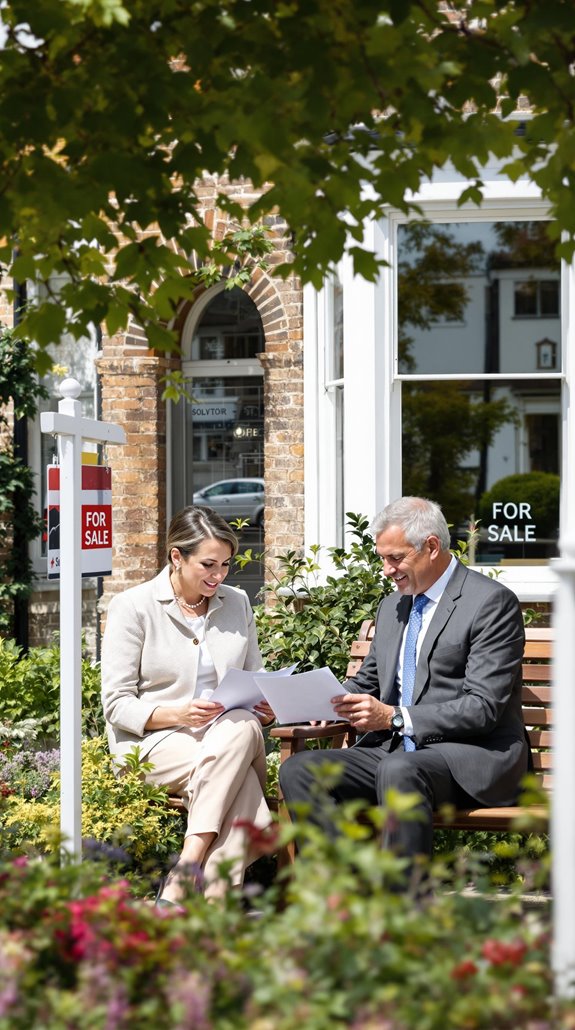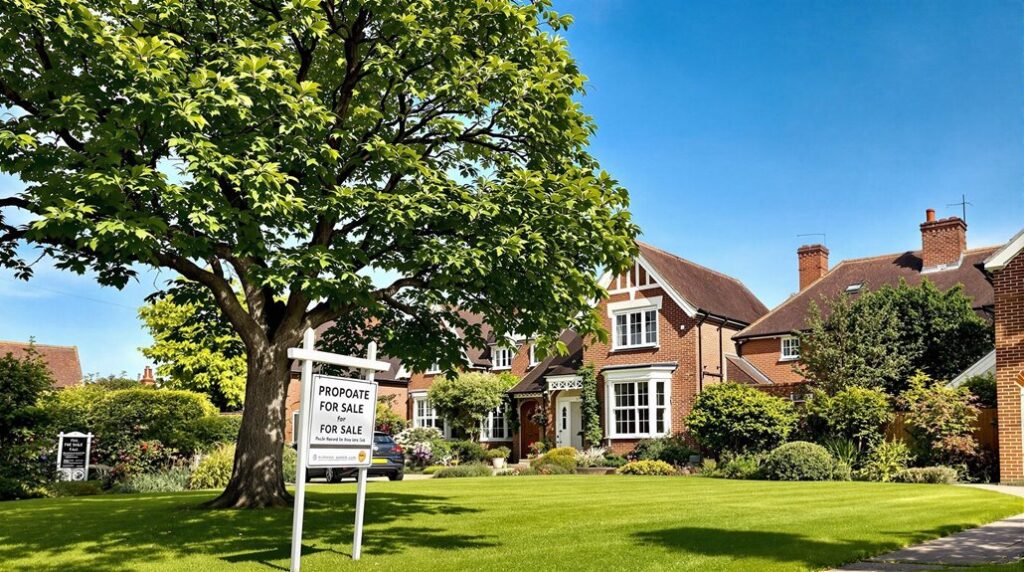I’ve helped countless families navigate the complex process of selling inherited property, and I’ll be honest—it’s more straightforward than most people expect once you understand the key steps. The biggest misconception I encounter is that you can’t do anything until probate’s complete, but that’s simply not true. You can actually start marketing your inherited house before obtaining the Grant of Probate, which means you’re already ahead of the game if you know what actions to take first.
Key Takeaways
- Executors need a Grant of Probate before completing any house sale, though property marketing can begin immediately.
- Professional RICS property valuation is legally required for probate applications and must reflect open market value at death.
- All beneficiaries must approve the accepted offer before contract exchange, and estate debts must be settled first.
- Probate house sales typically take 25 weeks to complete, longer than standard sales due to additional legal requirements.
- Solicitor fees range from £1,000-£5,000 for straightforward estates, plus £300 Probate Registry fee and potential inheritance tax.
Understanding Your Legal Authority as Executor

When you’re named as executor in a will, you’ll gain significant legal authority to sell estate property—even if beneficiaries don’t agree with your decision. Your duty to act in the estate’s best interests takes precedence over individual beneficiary preferences or objections about sale price or buyer selection.
However, you can’t just wing it. You’ll need a Grant of Probate before completing any sale, though you can start marketing the property beforehand. This court-issued document validates your authority to handle estate assets and reassures buyers they’re dealing with the rightful representative. To avoid potential liability, you must ensure the property sells for fair market value rather than accepting offers significantly below what the estate could reasonably obtain. Additionally, you might consider obtaining a house survey to assess the property’s condition and value accurately before the sale.
Obtaining Professional Property Valuation
Before you can proceed with selling the house, you’ll need a professional property valuation that meets HMRC’s strict requirements. I must hire a RICS chartered surveyor – they’re the only professionals HMRC accepts for probate valuations. This isn’t optional; it’s vital for legal compliance.
The surveyor will assess the property’s open market value at the exact date of death, not current market conditions. They’ll examine structural condition, recent improvements, local market trends, and comparable sales data. The cost of this valuation can vary based on factors such as property size and location. I’ll need to provide property documents and photographs showing the estate’s condition.
The written report becomes significant documentation for the IHT400 form if the estate exceeds tax thresholds. Remember, this probate value determines inheritance tax liability, regardless of what the property eventually sells for. Any lifetime gifts made within seven years of death must also be included in the overall estate valuation alongside the property value.
Applying for Grant of Probate
With your professional property valuation complete, I can now focus on securing the legal authority to sell the house. You’ll need to apply for a Grant of Probate, which gives you legal power to manage the deceased’s estate.
First, verify you’re over 18 and report the estate value to HMRC. If inheritance tax is due, pay it and wait 20 working days before applying. For estates under £5,000, there’s no fee; otherwise, expect to pay £215 (rising to £300 from May 2024).
I recommend applying online through GOV.UK—it’s faster than postal applications. You’ll need the death certificate, original will, and completed inheritance tax forms. Processing typically takes 16 weeks, so plan accordingly for your house sale timeline. Financial institutions will often require proof of probate before allowing you to access or transfer the deceased’s assets.
Marketing Your Property Before Probate Completion
Although the Grant of Probate won’t arrive for several months, I can start marketing the property immediately to build buyer interest and speed up the eventual sale.
I’ll begin by listing the property on online portals with professional photography and virtual tours to attract remote buyers. Targeted advertising through Google Ads and social media helps reach potential purchasers effectively.
Auction houses offer excellent marketing strategies with their established buyer networks and bespoke promotional plans. They’re particularly effective for reaching investors who frequently buy probate properties.
I should highlight any renovation potential or buy-to-let opportunities to attract investor buyers. Emphasising eco-friendly features appeals to sustainability-conscious purchasers. Additionally, understanding local market dynamics can provide valuable insights into potential high-demand areas for prospective buyers.
Working with probate-experienced estate agents provides access to their marketing expertise and buyer networks, ensuring the property receives maximum exposure before completion. The increased inventory from probate properties can help stabilize prices in markets with limited housing stock.
Choosing the Right Sale Method
Once I’ve built initial buyer interest through marketing, I need to decide how to actually sell the property. I’ve got five main options to choose from.
Traditional estate agents offer maximum market exposure but charge 1-3% fees and face probate delays. Property auctions provide certainty with fixed sale dates, though I’ll pay 2.5% plus VAT and need probate before completion.
Direct cash sales let me complete within weeks without agent fees, but I’ll likely accept below-market offers. Solicitor-led private treaty sales reduce costs but require me to handle viewings myself. Additionally, it’s crucial to consider potential property issues like subsidence risks that could affect the sale price and buyer interest.
Hybrid online auction platforms are increasingly popular, offering 28-56 day completion windows with lower 1-1.5% fees while attracting wider buyer pools. I’ll weigh speed, cost, and expected sale price against my estate’s specific needs. Throughout this process, I must maintain open communication with potential buyers about the probate status to avoid complications during the sale.
Managing the Exchange and Completion Process
Before I can exchange contracts on a property sale, I must secure the Grant of Probate – there’s no way around this legal requirement. I’ll need to settle inheritance tax first, either fully or through 10-year instalments if applicable. Once I’ve got probate in hand, I can set a realistic completion date with my solicitor. It’s also important to be aware of any potential hidden costs related to the sale that may arise unexpectedly.
I must guarantee all beneficiaries unanimously approve the accepted offer before exchanging contracts. Remember, contracts become legally binding at exchange – withdrawal after this point triggers penalties. I’ll coordinate with my conveyancing solicitor to finalize terms and clear the property completely before completion.
On completion day, I’ll receive the sale proceeds through my solicitor. These funds first cover outstanding estate debts before distribution to beneficiaries according to the will. The probate process can vary significantly in duration, often taking months or even years to complete.
Clearing Estate Debts and Distributing Proceeds

When I receive the sale proceeds from a property sold through probate, I can’t simply distribute the money to beneficiaries right away. I must first settle all estate debts – including loans, utilities, mortgages, and taxes – before any distributions occur. This means using the house sale proceeds to pay inheritance tax, income tax, and capital gains tax liabilities that have accumulated during administration. Additionally, I may need to account for solicitor fees to ensure that all legal aspects of the sale are properly handled.
I’ll need to withhold a reserve fund for unquantified debts like pending tax bills or legal fees. I must also guarantee I’ve properly advertised for creditors through The Gazette and waited the required two-month-and-one-day period for claims. Only after receiving tax clearance from authorities and confirming all debts are settled can I safely distribute the remaining proceeds to beneficiaries according to the will.
As executor, I have one year from obtaining the grant of probate to complete the estate administration and distribution process. During this period, beneficiaries cannot force me to distribute assets, allowing sufficient time to handle all necessary administrative tasks properly. This timeline ensures thorough estate management while protecting me from potential liability issues.
Timeline Expectations and Associated Costs
Understanding the financial and time commitments involved in selling a house through probate helps you plan effectively and set realistic expectations.
You’ll face a complete timeline of 6-12 months from start to finish. Probate application processing averages 16 weeks, though simple cases can conclude within two months. Once you’ve received the grant, selling the property takes around 25 weeks – longer than standard house sales. Be prepared for potential pitfalls, such as escalating ground rents, which can complicate the sale process.
Your costs will include solicitor fees ranging from £1,000-£5,000 for straightforward estates, rising to £20,000+ for complex cases. You’ll pay £300 for Probate Registry fees plus £6 per beneficiary for bankruptcy searches. Don’t forget RICS property valuations and potential inheritance tax obligations.
Budget extra time and money for unexpected complications – they’re more common than you’d think. The conveyancing process alone typically requires an additional 12-16 weeks after an offer is accepted on the property.
Conclusion
I’ve walked you through the essential steps to sell your inherited property efficiently. You now understand your executor responsibilities, valuation requirements, and the probate process. Remember, you can start marketing before probate completes, saving valuable time. Focus on getting professional valuations, clearing debts systematically, and choosing the right sale method for your situation. With proper planning and organization, you’ll navigate this process successfully while maximizing your property’s value.
References
- https://hoa.org.uk/advice/guides-for-homeowners/i-am-selling/selling-a-probate-house/
- https://www.propertyinvestmentsuk.co.uk/sell-house-under-probate/
- https://www.martinco.com/guides/buying/buying-a-house-in-probate-what-you-need-to-know/
- https://hsconveyancing.com/help-guidance/guide-to-selling-as-an-executor/
- https://the-probate-network.co.uk/how-to-manage-a-probate-house-sale/
- https://www.phrsolicitors.co.uk/legal-services-for-individuals/wills-and-probate/resources/can-executor-will-sell-property-without-all-beneficiaries-approving
- https://lockings.co.uk/can-an-executor-buy-property-from-the-estate-uk/
- https://www.solegal.co.uk/insights/selling-property-executor
- https://www.gnlaw.co.uk/news/what-an-executor-can-and-cannot-do/
- https://coodes.co.uk/2021/04/nine-steps-for-executors-when-dealing-with-a-property/

